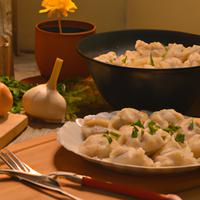
1 serving (150 grams) contains 250 calories, 12.0 grams of protein, 10.0 grams of fat, and 30.0 grams of carbohydrates.

Log this food in SnapCalorie

Nutrition Information
Calories |
394.3 | ||
|---|---|---|---|
% Daily Value* |
|||
| Total Fat | 15.8 g | 20% | |
| Saturated Fat | 6.3 g | 31% | |
| Polyunsaturated Fat | 0 g | ||
| Cholesterol | 63.1 mg | 21% | |
| Sodium | 788.6 mg | 34% | |
| Total Carbohydrates | 47.3 g | 17% | |
| Dietary Fiber | 1.6 g | 5% | |
| Sugars | 3.2 g | ||
| protein | 18.9 g | 37% | |
| Vitamin D | 0 mcg | 0% | |
| Calcium | 63.1 mg | 4% | |
| Iron | 3.2 mg | 17% | |
| Potassium | 236.6 mg | 5% | |
* Percent Daily Values are based on a 2,000 calorie diet. Your daily values may be higher or lower depending on your calorie needs.
Food Attributes
Source of Calories
About Siberian dumplings
Siberian dumplings, known as "pelmeni," are a traditional staple of Russian cuisine, originating from Siberia's historic culinary practices. These dumplings consist of thinly rolled dough envelopes filled with seasoned minced meat, typically a mix of pork, beef, or lamb, though vegetarian variations may exist. Pelmeni are often boiled and served with sour cream, butter, or vinegar as toppings. While pelmeni provide a hearty and satisfying meal, their nutritional profile varies based on preparation. The dumplings are a good source of protein due to the meat filling but can be calorie-dense depending on the amount of butter or cream used. They are traditionally made with white flour dough, which offers little fiber. For a healthier version, whole wheat dough and lean meats can be used as substitutes. Pelmeni can be enjoyed in moderation as part of a balanced diet, especially when paired with fresh vegetables or light sides.



